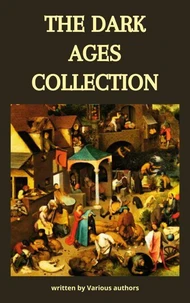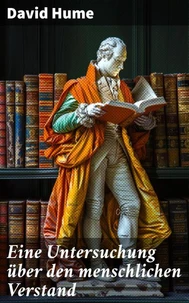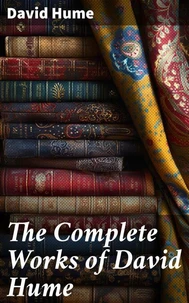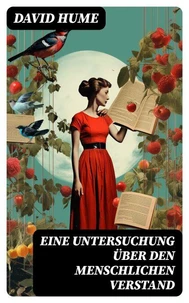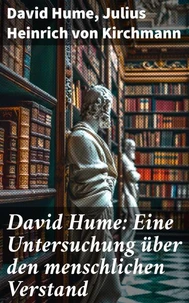Of the Standard of Taste
Par :Formats :
Disponible dans votre compte client Decitre ou Furet du Nord dès validation de votre commande. Le format ePub est :
- Compatible avec une lecture sur My Vivlio (smartphone, tablette, ordinateur)
- Compatible avec une lecture sur liseuses Vivlio
- Pour les liseuses autres que Vivlio, vous devez utiliser le logiciel Adobe Digital Edition. Non compatible avec la lecture sur les liseuses Kindle, Remarkable et Sony
 , qui est-ce ?
, qui est-ce ?Notre partenaire de plateforme de lecture numérique où vous retrouverez l'ensemble de vos ebooks gratuitement
Pour en savoir plus sur nos ebooks, consultez notre aide en ligne ici
- Nombre de pages21
- FormatePub
- ISBN859-65--4701968-8
- EAN8596547019688
- Date de parution29/05/2022
- Protection num.Digital Watermarking
- Taille448 Ko
- Infos supplémentairesepub
- ÉditeurDIGICAT
Résumé
In "Of the Standard of Taste, " David Hume explores the intricate relationship between aesthetic judgment and personal sentiment, examining how cultural and contextual factors shape our understanding of beauty and taste. Hume employs an analytical and philosophical style, intertwining personal reflections with rigorous reasoning to propose that while taste may appear subjective, there exist certain universal principles that guide our aesthetic evaluations.
The essay emerges from the broader Enlightenment discourse on empiricism, where the interplay of reason and emotion comes to the fore, positioning Hume's work as a pivotal contribution to both aesthetics and philosophy. David Hume (1711-1776), the eminent Scottish philosopher, historian, and essayist, is renowned for his profound influence on the development of empiricism and skepticism. Hume's own passionate engagement with literature and the arts, coupled with his keen philosophical inquiry into human nature, profoundly informed this exploration of taste.
His experiences navigating the complexities of human emotions and societal norms helped shape his understanding of how aesthetic standards evolve through collective agreement and shared experiences. This incisive essay is essential for anyone interested in the philosophy of art or the psychology of taste. Hume challenges readers to reflect critically on their aesthetic preferences while acknowledging the cultural influences that shape them, making this work a foundational text in both literary theory and aesthetic philosophy.
The essay emerges from the broader Enlightenment discourse on empiricism, where the interplay of reason and emotion comes to the fore, positioning Hume's work as a pivotal contribution to both aesthetics and philosophy. David Hume (1711-1776), the eminent Scottish philosopher, historian, and essayist, is renowned for his profound influence on the development of empiricism and skepticism. Hume's own passionate engagement with literature and the arts, coupled with his keen philosophical inquiry into human nature, profoundly informed this exploration of taste.
His experiences navigating the complexities of human emotions and societal norms helped shape his understanding of how aesthetic standards evolve through collective agreement and shared experiences. This incisive essay is essential for anyone interested in the philosophy of art or the psychology of taste. Hume challenges readers to reflect critically on their aesthetic preferences while acknowledging the cultural influences that shape them, making this work a foundational text in both literary theory and aesthetic philosophy.
In "Of the Standard of Taste, " David Hume explores the intricate relationship between aesthetic judgment and personal sentiment, examining how cultural and contextual factors shape our understanding of beauty and taste. Hume employs an analytical and philosophical style, intertwining personal reflections with rigorous reasoning to propose that while taste may appear subjective, there exist certain universal principles that guide our aesthetic evaluations.
The essay emerges from the broader Enlightenment discourse on empiricism, where the interplay of reason and emotion comes to the fore, positioning Hume's work as a pivotal contribution to both aesthetics and philosophy. David Hume (1711-1776), the eminent Scottish philosopher, historian, and essayist, is renowned for his profound influence on the development of empiricism and skepticism. Hume's own passionate engagement with literature and the arts, coupled with his keen philosophical inquiry into human nature, profoundly informed this exploration of taste.
His experiences navigating the complexities of human emotions and societal norms helped shape his understanding of how aesthetic standards evolve through collective agreement and shared experiences. This incisive essay is essential for anyone interested in the philosophy of art or the psychology of taste. Hume challenges readers to reflect critically on their aesthetic preferences while acknowledging the cultural influences that shape them, making this work a foundational text in both literary theory and aesthetic philosophy.
The essay emerges from the broader Enlightenment discourse on empiricism, where the interplay of reason and emotion comes to the fore, positioning Hume's work as a pivotal contribution to both aesthetics and philosophy. David Hume (1711-1776), the eminent Scottish philosopher, historian, and essayist, is renowned for his profound influence on the development of empiricism and skepticism. Hume's own passionate engagement with literature and the arts, coupled with his keen philosophical inquiry into human nature, profoundly informed this exploration of taste.
His experiences navigating the complexities of human emotions and societal norms helped shape his understanding of how aesthetic standards evolve through collective agreement and shared experiences. This incisive essay is essential for anyone interested in the philosophy of art or the psychology of taste. Hume challenges readers to reflect critically on their aesthetic preferences while acknowledging the cultural influences that shape them, making this work a foundational text in both literary theory and aesthetic philosophy.



